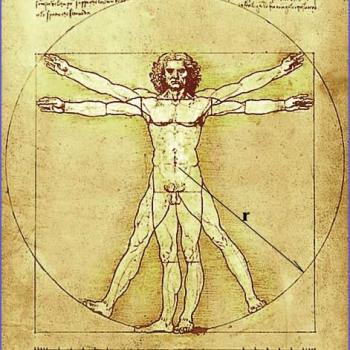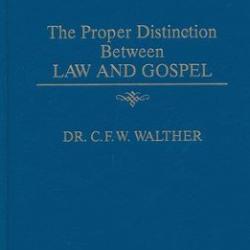The doctrine of God does not tend to be a primary issue in contemporary Lutheran theological discussions. Apart from basic Trinitarian theology, Lutheran theological journals and publications tend not to emphasize Theology Proper, and specifically the attributes of God. I think there are a number of reasons for this. First, Lutherans tend to avoid overt speculation, and are somewhat reticent to utilize extensive philosophical categories at the expense of clear Biblical language. Second, Christology tends to dominate the theological landscape, as the ultimate revelation of God’s being and character is found in the humility of the Son of God. Third, there just simply haven’t been a large number of debates in Lutheran history surrounding the doctrine of God. A quick perusal of the Lutheran blogosphere will demonstrate that issues in debate tend to center around the third use of the law, church fellowship, closed communion, and ecclesiology. Debate tends to control theological discussion, and for that reason, the attributes of God are not a commonly discussed issue.
This reality has, I think, been detrimental to the Lutheran church, as the doctrine of God is an essential theological issue which has important implications for these other debated topics. Statements are often made in passing with regard to the law-gospel distinction in particular, which contradict several aspects of classical Theism. This is not done as a purposeful rejection of these categories, but largely because these ideas are simply unknown, or at least of secondary importance. An understanding of divine simplicity, in particular, helps one to avoid some errors regarding the distinction between law and gospel.
The doctrine of divine simplicity teaches that there are no parts in God. This does not simply mean physical parts, like limbs on a body, but there is no division within God whatsoever. Article I of the Augsburg Confession affirms this teaching by using the language that God is “indivisible.” God does not have separate attributes which can be separated from one another, nor are these attributes different from his essence. God’s attributes are his essence. Each attribute is the same as the others. God does not have accidental properties that are separate from his very being. These are attributes of creatureliness. If God were composed of parts, in any sense, this would mean that God could be broken up into some reality more fundamental than himself which is an impossibility.
This might seem confusing since in Scripture, God does seem to have attributes that differ from one another. His wrath is different from his love which is different from his holiness, power, etc. These are not, however, to be seen as distinctions within God himself, but in our perception of God. A perception of God as he is in his bare essence is impossible for the human creature, not merely due to sin, but to the quidditative distinction (a distinction of being) between God and man. Man’s knowledge of God is never archetypal (the full and comprehensive knowledge that God has of himself), but ectypal (derived, or patterned after the knowledge that God has of himself). We can never know God as he is in himself, but only as he has revealed himself to us. This being the case, God has used language that we can understand in order to communicate himself to human creatures. In some sense then, God divides himself into parts (in terms of human perception), while remaining essentially one purely simple divine essence.
 All of this may seem rather abstract, but it is an essential point for our understanding of the distinction between law and gospel. At times, the law and the gospel might be viewed as exact opposites. Francis Pieper, for example, notes that “In content, the Law and Gospel are actually, like yes and no, perfect opposites” (Christian Dogmatics III:228). If one reads Pieper on law and gospel, without first considering his extensive discussion of God’s simplicity in volume I of his Christian Dogmatics, one might make the assumption that these two words of God are actually contradictory in essence. This is, however, an impossibility. If both law and gospel are words of God, and expressions of his own nature and character (the gospel of his grace, and the law of his moral nature), then they, by definition cannot contradict one another. In a strict sense then, there is no actual distinction within God regarding his grace and his wrath. These are mere human perceptions. Pieper notes that we, as limited creatures, cannot in fact comprehend how both wrath and grace can simultaneously exist in God. This is not due to any contradiction in God however, but “our limitation is due to the fact that our mundane knowledge of God bears the stamp: ‘Now I know in part’ (1 Cor. 13:12)” (Christian Dogmatics III:235). Pieper rightly understands that the contradiction then is not in God himself, but the human creature to whom these two words have opposing effects.
All of this may seem rather abstract, but it is an essential point for our understanding of the distinction between law and gospel. At times, the law and the gospel might be viewed as exact opposites. Francis Pieper, for example, notes that “In content, the Law and Gospel are actually, like yes and no, perfect opposites” (Christian Dogmatics III:228). If one reads Pieper on law and gospel, without first considering his extensive discussion of God’s simplicity in volume I of his Christian Dogmatics, one might make the assumption that these two words of God are actually contradictory in essence. This is, however, an impossibility. If both law and gospel are words of God, and expressions of his own nature and character (the gospel of his grace, and the law of his moral nature), then they, by definition cannot contradict one another. In a strict sense then, there is no actual distinction within God regarding his grace and his wrath. These are mere human perceptions. Pieper notes that we, as limited creatures, cannot in fact comprehend how both wrath and grace can simultaneously exist in God. This is not due to any contradiction in God however, but “our limitation is due to the fact that our mundane knowledge of God bears the stamp: ‘Now I know in part’ (1 Cor. 13:12)” (Christian Dogmatics III:235). Pieper rightly understands that the contradiction then is not in God himself, but the human creature to whom these two words have opposing effects.
In popular theological dialogue among Lutherans, law and gospel are sometimes spoken of in such a way as to seemingly imply that these are two contradictory aspects of the divine nature. Salvation then does not consist in God fulfilling the law vicariously in Christ, but in God’s grace overcoming God’s wrath. Salvation is then an ad intra reality within the Triune God himself. Through the cross, God the Son as the revealed God overcomes the hidden God of wrath. In this way, God, like creatures, is composed of both act (what God is) and potency (God’s potential to become). In classical Theism, God does not have passive potency (the potential to be changed within himself) but only active potency (the ability to change things outside of himself). Rejections of various aspects of classical Theism are particularly prominent in the theology of Oswald Bayer. Speaking about the dialectic between wrath and grace, Bayer writes: “God is not consistent but contradicts himself. Here we see God against God!” (Theology the Lutheran Way, 104). This idea that God can be “against himself” presupposes that God is not, in fact, an utterly simple being, but that wrath and grace are two contrary modes of being in God. In a more blatant statement surrounding redemption’s affect upon the Trinity ad intra, Bayer writes: “God’s eternal being itself is profoundly affected by Jesus’ death on the cross.” (Theology the Lutheran Way, 9). This is inconsistent with the Lutheran scholastic tradition which did not seek to modify the traditional Western doctrine of God, but actually affirmed it in Article I of the AC and other parts of the Lutheran Confessional documents.
The lack of education surrounding the doctrine of God within Lutheranism has had a profound impact upon the church. Pastors have not often been equipped in these categories, and thus have bought uncritically into the works of men like Oswald Bayer who reject traditional metaphysics, and thus the classical attributes of God. The contradiction between a quia subscription to the Book of Concord and a rejection of divine simplicity (and immutability along with it) has often been missed. This has had a further impact upon the proper explanation of law and gospel as two contradictory aspects of God, rather than a unity in God which approaches sinners in two very different ways. While we human creatures will never understand how wrath and grace cohere within God himself, we must simply accept and proclaim that somehow they do, and that God does not have to overcome anything within himself to save us sinners.












